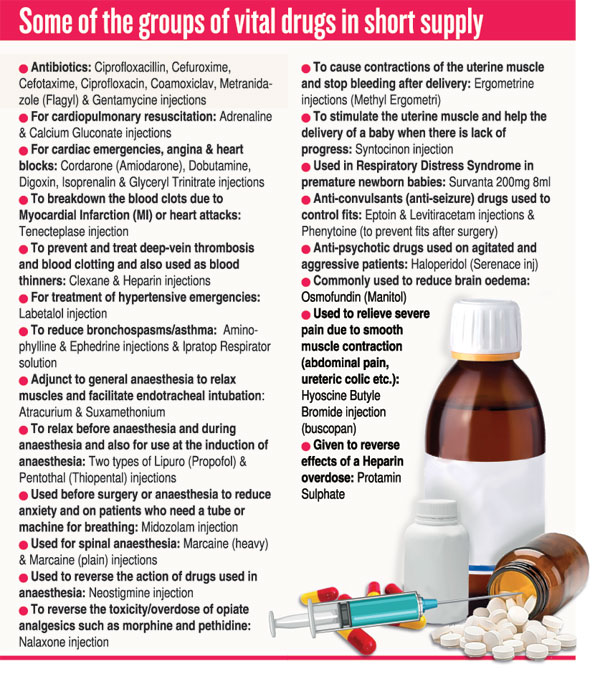News
Private hospitals ring alarm bells over essential drugs; put forward 2 proposals to regulatory body
Private hospitals have put forward two urgent plans to bring in the critically needed life-saving drugs to treat their patients.
Cautioning that this is an emergency and disaster situation, the Association of Private Hospitals and Nursing Homes (APHNH) has held discussions with the Health Ministry about the possibility of securing donations from people abroad or using two private hospital groups which have foreign exchange reserves abroad to import the drugs, the association’s Secretary Dr. Sunil Ratnapreya told the Sunday Times.
The two suggestions have been proposed to the Private Health Services Regulatory Council (PHSRC) which is chaired by the Director-General (DG) of Health Services, Dr. Asela Gunawardena.
Dr. Ratnapreya said that there is an urgent need to get these essential drugs. However, even getting donations is a complex process, unlike securing tsunami contributions. Following the APHNH’s suggestion of seeking donations, the DG had requested them to submit two lists – a list of drugs which are in short supply and a list of potential drugs which are to be donated along with the name of the manufacturer; date of expiry; and quantity to be donated. 
The APHNH has already submitted a list of 76 urgently needed drugs including antibiotics; those needed in surgical operations including muscle relaxants; a drug used to revive a patient who has been put to sleep for a procedure; a spinal anaesthetic; and drugs used when a person suffers a heart attack (myocardial infarction) among many others.
According to the APHNH there is also a severe dearth of endotracheal (ET) tubes, suction tubes, nasogastric (NG) tubes, urinary catheters, spinal needles and suture material.
“The Health Ministry is trying to source some of the drugs from the State Pharmaceutical Corporation (SPC) through the Medical Supplies Division (MSD). If the SPC is not able to meet our requirements, the DG will consider facilitating the donations in coordination with Customs as well as the National Medicines Regulatory Authority (NMRA),” Dr. Ratnapreya said.
With regard to the second suggestion of getting two private hospital groups to bring in the much-needed drugs, he said that the APHNH is not requesting brands but counterparts of drugs already being imported by the SPC. This can be done within set protocols and with transparency, while keeping a tab on prices.
Dr. Ratnapreya reiterated that the situation is “really bad”, with some private hospitals having stocks for a month, others for two months and almost all others for only three months. The APHNH had informed the PHSRC in February about the impending shortages and it had been forwarded to the then State Ministry of Pharmaceuticals.
The membership of the APHNH comprises around 100 big, medium and small private hospitals from across the country of around 200 registered with the PHSRC. Among its members are all the big private hospitals such as the Asiri Group, Durdans, Hemas Group, King’s Hospital, Lanka Hospitals and Nawaloka Hospitals.
When considering Outpatient Department treatment and channelling, 70% of the patients seek services from private hospitals and General Practitioners, with the balance 30% seeking state hospital services. However, when it comes to in-patient services, the numbers are reversed with 70% going into state hospitals and the balance 30% to private hospitals.
Meanwhile, a media release issued by the Society of Government Pharmacists on Friday stated that the Colombo MSD does not have stocks of 525 medicines and 5,376 surgical consumables.
Usually, the MSD stocks 1,358 medicines and of these 38.7% are not in stock currently, while it has stocks of 8,553 surgical consumables of which 62.9% are not in stock now.
Among these non-available stocks are six life-saving drugs and 239 essential drugs.
The society points out that the stocks of drugs needed for heart attacks and also the rabies vaccine have run out and imports under the India credit line will take about six weeks to arrive in the country.
| No interruption to patient services, operations at LRH, says Director “Patient services including cardiac surgeries are being performed without interruption,” said the Director of the Lady Ridgeway Hospital (LRH) for Children, Dr. G. Wijesuriya when contacted by the Sunday Times over a ‘request’ letter signed by him which is being shared extensively on social media. He said that the letter seeking consumables for the general theatre and the Surgical Intensive Care Unit (ICU) was issued on the personal request of a Consultant who wished to secure such a donation for the LRH. “I am not in agreement with such a letter being used by people for political advantage,” said Dr. Wijesuriya, pointing out that such donations happen throughout. When asked whether there was a shortage of drugs and consumables, he said that when considering the foreign exchange crisis the country is facing, there are “podiadupadu”. He, however, stressed that paediatric services of this premier children’s hospital are continuing and there is no interruption. | |
The best way to say that you found the home of your dreams is by finding it on Hitad.lk. We have listings for apartments for sale or rent in Sri Lanka, no matter what locale you're looking for! Whether you live in Colombo, Galle, Kandy, Matara, Jaffna and more - we've got them all!

